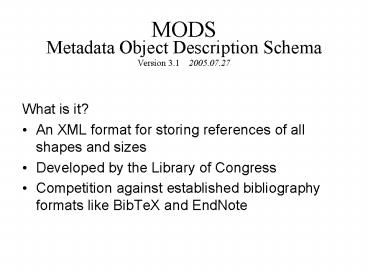MODS - PowerPoint PPT Presentation
1 / 7
Title:
MODS
Description:
For a large-scale bibliography manager, MODS is preferable due to its high level ... Manager doesn't access MODS XML but it needs to be aware of the values it may ... – PowerPoint PPT presentation
Number of Views:197
Avg rating:3.0/5.0
Title: MODS
1
MODS
Metadata Object Description Schema
Version 3.1 2005.07.27
- What is it?
- An XML format for storing references of all
shapes and sizes - Developed by the Library of Congress
- Competition against established bibliography
formats like BibTeX and EndNote
2
MODS
Book Citation Example
Blundell, Tom. Protein Crystallography. New
York Academic Press, 1976.
MLA
MODS
BibTeX
Clearly, the MODS format provides a higher level
of detail than existing ones. This is both an
advantage and a disadvantage.
3
MODS
- Why do people like MODS?
- Allows for extremely detailed characterization of
all reference aspects - Allows for enhanced structuring of data which
permits references within references - Allows for special cases that are hard to handle
in a simplistic environment - Benefits of XML
4
MODS
MODS
Academic Journal Citation Example
BibTeX
Notice the reference type is clearly defined in
the first line of BibTeX. The same cannot be said
for MODS.
5
MODS
- Why do people dislike MODS?
- Determining the type of a particular reference
requires going through a variety of fields
within, all other format have a simple type field - Not everyone likes the MARC standard
- The ability to deviate from the MARC standard is
a double-edged sword because MODS entries which
do so wont work with existing programs
6
MODS
- Usage with OObib
- For a large-scale bibliography manager, MODS is
preferable due to its high level of detail - OObib API will be designed to provide the Ref.
Manager with a front-end to the MODS data - Ref. Manager doesnt access MODS XML but it needs
to be aware of the values it may have to work
with when reading, writing, or searching
references - MODS is used in official OpenOffice bibliography
managing software
7
MODS
Presentation Sources
Metadata Object Description Schema
(MODS) http//www.loc.gov/mods
Introduction to MODS version 3 http//www.scripps.
edu/cdputnam/software/bibutils/mods_intro.html































